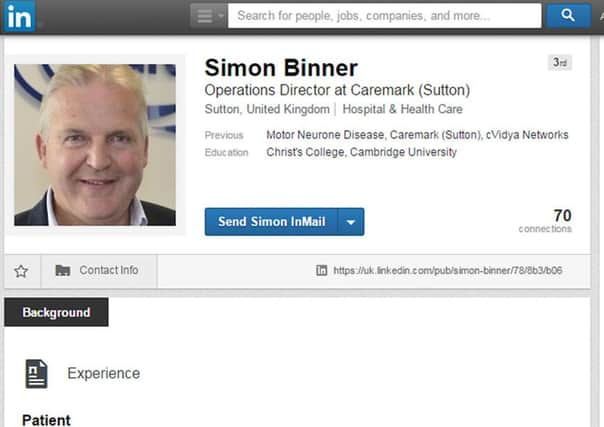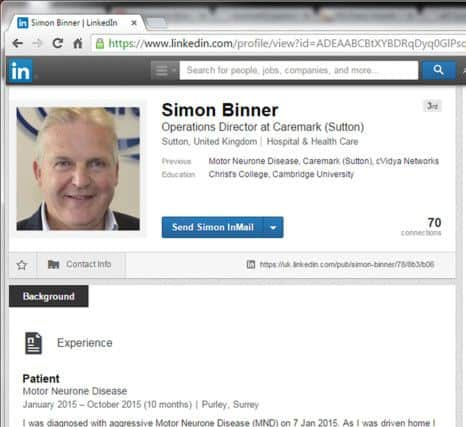Man who announced death on LinkedIn ‘set to end life’


The profile for company director Simon Binner, 57, who was diagnosed with aggressive motor neurone disease (MND) in January, says: “I died in Switzerland with Eternal Spirit on Mon 19 Oct 2015 and my funeral was on Fri 13 Nov 2015.”
Mr Binner, of Purley, Surrey, is set to attend the clinic in Basel where he will be assisted to die, according to his professional profile.
Advertisement
Hide AdAdvertisement
Hide AdIn a section entitled Patient, it also reads: “My MND accelerated very rapidly. The sawbones initially thought I would last until 2017/2018, but they were mistaken - no worries, it’s an inexact science!


“I don’t recommend MND! Better to have one massive fatal stroke or be killed instantly by a drunk driver! There is nothing that I can say that’s positive about MND.”
In a video filmed with the law firm Bindmans LLP, his wife Debbie Binner, a former Sky News presenter, said he “strongly” believes he has the legal right to choose when he will die.
She told how Mr Binner, a Cambridge University graduate, was rushed into choosing when he would die because assisted suicide is illegal in Britain.
In a clip posted on YouTube, Mrs Binner said: “He doesn’t want to go to Switzerland and he doesn’t want to go into a hospital. He wants to be at home as much as possible with his friends and family.
“And I think the most important thing to say is that Simon believes if that was available in the UK he may well want to stay alive longer. Christmas would be lovely for us to have Simon.”
Mr Binner, who spoke with a slur, said: “I don’t want to go to Switzerland either. I want to be here for Christmas but I can’t be because I don’t know. I have to go.”
British Humanist Association (BHA) chief executive Andrew Copson said he supports a change in the law for those who are terminally and incurably suffering to end their lives, provided they have made a rational, committed and uncoerced decision.
There are about 5,000 people living with MND in the UK, according to the NHS. There is no known cure.